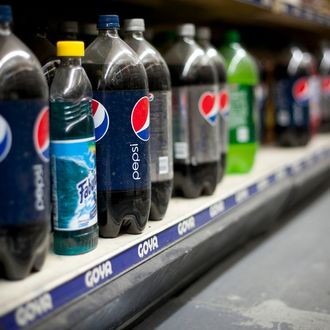
Mayor Bloomberg’s ban on absurdly large sodas is now facing a long legal battle that might not be resolved before he leaves office, but in the meantime, the most high-profile attack on sugary beverages has stirred up more controversy over the link between the soft-drink industry and minority groups. While the obesity rate is higher among blacks and Hispanics, the New York Times reports that many of these groups have opposed legislation that targets sugary beverages, calling them “discriminatory, paternalistic, or ineffective.” Minority organizations also happen to be receiving tens of millions of dollars in donations from the beverage industry.
The ties between the minority groups and soda companies came up in January when the New York chapter of the NAACP and the Hispanic Federation, which have both received funding from Coca-Cola or PepsiCo, supported the legal effort to block Mayor Bloomberg’s so-called soda ban. They argued that the ban would hurt minority-owned businesses and suggested that providing more funding for physical education in public schools would be a better solution.
The Times reports that similar situations have arisen in other parts of the country, such as Richmond, California, where the industry enlisted the help of black and Hispanic organizations to defeat soda tax legislation in the fall. States including Massachusetts, Vermont, and California are currently considering raising taxes on soda, but through lobbying and forming coalitions with local groups, the beverage industry has already been able to fend off such legislation in 30 states.
There’s no evidence that minority organizations are being explicitly told to oppose soda bans. However, funding is often hard to come by for these groups, and donations from the beverage industry can be crucial. Thus, critics say there’s little motivation to challenge soda manufacturers on obesity. “They’re taking the money and looking the other way on obesity, diabetes, heart disease,” says Gus K. West, president of the Hispanic Institute, which supports stricter regulation of sugary drinks. “They look the other way or issue statements that have no teeth or don’t go after the industry.”
Representatives for the beverage industry counter that they’ve supported minority groups for decades, long before people drinking cups of soda bigger than their heads was an issue in this country. (As BuzzFeed points out, years ago the tobacco industry was using similar tactics to woo cash-strapped minority organizations.) Of course, plenty of soda legislation opponents aren’t receiving massive corporate donations, and representatives for the soda industry seem offended that some think their motivation for giving away millions isn’t entirely pure. Katelyn Jackson, a spokeswoman for Coca-Cola, added, “The suggestion that our community philanthropic efforts are motivated by something other than good will is grossly inaccurate and ignores our history of true partnership for well over a century.”






























